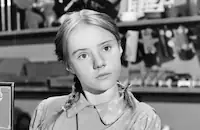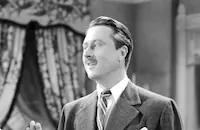Junior Miss
Brief Synopsis
Cast & Crew
George Seaton
Peggy Ann Garner
Allyn Joslyn
Michael Dunne
Faye Marlowe
Mona Freeman
Film Details
Technical Specs

Synopsis
Thirteen-year-old Judy Graves and her sixteen-year-old sister Lois are the source of much delight and exasperation to their lawyer father Harry and housewife mother Grace. The family's modest New York City apartment is constantly invaded by Judy's sarcastic friend Fuffy Adams and Lois' endless parade of beaus, but Harry and Grace monitor their daughters' adolescence with patience and amusement. One evening, Judy reads the overly dramatic autobiography she has written for her English class to her family and is interested to learn from them of the existence of a mysterious Uncle Willis, Grace's brother, who has been "away" for a long time, and about whom discussion is forbidden. Judy's curiosity is diverted by Fuffy, who introduces her to Haskell Cummings, Jr., the boy who is to escort Judy to an upcoming party. Judy is smitten by Haskell, who will be her first date, and then returns to her apartment, where Harry is welcoming his blowhard boss, J. B. Curtis, and J. B.'s long-suffering daughter and secretary Ellen. Judy mistakes Harry's kindness toward Ellen for romantic interest, and the next day, confides in Fuffy her fear that Harry and Ellen are having an affair. Judy and Fuffy, who continually refer to their favorite motion pictures for solutions to life's problems, are stumped, but that night, when Judy finally meets Uncle Willis, she hits upon an idea. Judy romanticizes the handsome Willis, whom she believes has been in prison, and thinks that if she introduces him to Ellen, he will win her affections from Harry. Actually, Willis, a former alcoholic, has spent the past four years rebuilding his life, and is welcomed warmly by Grace and Harry. On Christmas day, the family opens their presents, and Grace wistfully notes that Judy, who has received her first fur-trimmed coat and high heels, is big enough to start shopping in the "junior miss" department. That afternoon, Judy arranges for Willis to meet Ellen at the Rockefeller Center ice-skating pond, and her plan succeeds admirably. Over the next few days, the couple fall in love. and J. B. is mystified by Ellen's absence from the office. Fearing her father's interference, Ellen does not tell him about her romance, but Judy "spills the beans" on New Year's Day and confides that Willis is an ex-convict. The infuriated J. B. yells at Harry and Grace for allowing Willis and Ellen to become involved, and as they are arguing and upbraiding Judy for her meddling, Willis and Ellen arrive and announce that they are married. Fed up with J. B.'s selfishness, Harry speaks his mind and is fired for his defense of Willis. Later, Grace supports Harry's suggestion that she and the girls live with her mother while he finds another job, but soon the household is awash with tears. Ellen and Willis arrive, and Harry and Grace insist that the young couple live with them until they land on their feet, then hide them when J. B. enters and demands to see his daughter. As Harry and J. B. squabble, maid Hilda announces that Haskell is waiting for Judy. J. B. assumes that the Haskell in the lobby is Haskell Cummings, Sr., an important potential client, and that Harry is going to establish his own firm. Harry is mystified when J. B. offers to rehire him as a partner and also employ Willis, but quickly accepts the offer and watches as J. B. and Ellen reconcile. J. B. is astonished by the teenaged Haskell, but reassured when the boy intimates that his father wants to become a client of the firm. The family is then stunned by the appearance of Judy, who has been transformed by her party dress into a graceful, attractive young lady. Judy kisses her loved ones goodnight, then leaves for the party with Haskell.

Director
George Seaton
Cast

Peggy Ann Garner

Allyn Joslyn
Michael Dunne
Faye Marlowe

Mona Freeman
Sylvia Field

Barbara Whiting
Stanley Prager

John Alexander

Connie Gilchrist

Scotty Beckett
Alan Edwards
Dorothy Christy
William Frambes
Ray Klinge
Mickey Titus
Eddy Hudson
Mel Torme

Lillian Bronson
Tommy Mack
William Henderson
Howard Negley
Ruth Rickaby
Ruby Dandridge
Crew
Harold Arlen
David Buttolph
Bonnie Cashin
Charles [g.] Clarke
Maurice Depackh
Roger Heman
Arthur Jacobson
Mark-lee Kirk
R. A. Klune
Ernest Lansing
Thomas Little
Wolfgang Amadeus Mozart
Emil Newman
Ben Nye
William Perlberg
George Seaton
Fred Sersen
Roger Shearman
Robert Simpson
Murray Spivack
E. Clayton Ward
Lyle Wheeler

Film Details
Technical Specs

Quotes
Trivia
Notes
Jerome Chodorov and Joseph Fields's popular play was based on a series of twelve stories written by Sally Benson, which appeared in The New Yorker between 1939 and 1941. Benson's stories were collected in 1941 in a book entitled Junior Miss. According to a July 1943 Hollywood Reporter news item, Warner Bros. and independent producers William Goetz and Samuel Goldwyn were among the first to bid for the rights to the play. Later Hollywood Reporter news items and information in the Twentieth Century-Fox Records of the Legal Department, located at the UCLA Arts-Special Collections Library, disclose that actress/producer Mary Pickford, who had not made a film since the 1933 United Artists release Secrets (see AFI Catalog of Feature Films, 1931-40; F3.3955), was the first producer to acquire the property. A July 14, 1943 Hollywood Reporter news item noted that Max Gordon, the play's Broadway producer, was in association with Pickford in the bid and would co-produce the film version with her.
In a August 10, 1943 Hollywood Reporter article, Pickford announced that she intended to star unknown actors in the film and would feature them in a series of pictures based on Benson's characters. In late November 1943, Pickford screen tested three members of the Broadway stage company: Patricia Peardon, who played "Judy," Lenore Lonergan, who played "Fuffy," and Alexander Kirkland, who played "Uncle Willis." According to a May 25, 1944 Hollywood Reporter news item, Pickford "acquired the property for $350,000, plus a percentage arrangement," but the deal fell through because of what Pickford "considered exorbitant percentage demands." The rights to Junior Miss were then purchased by Warner Bros., the news item reported, although Twentieth Century-Fox and independent producer Hal B. Wallis had also expressed interest. In June 1944, a Hollywood Reporter news item announced that Jack Warner had chosen Joyce Reynolds to play Judy.
After the Warner Bros. deal fell through, Junior Miss was bought by Twentieth Century-Fox for $400,000 in October 1944, according to a Hollywood Reporter news item, which noted that the studio had earlier contemplated hiring Fields to direct the film version. The studio records reveal that Twentieth Century-Fox also purchased, for $25,000, a screenplay written by Chodorov and Fields, but the extent of their contribution to the picture's completed script has not been determined. According to a December 1944 Hollywood Reporter news item, Alfred Hitchcock's daughter Pat was tested for the role of Fuffy. Although a February 1945 Hollywood Reporter news item includes Donna Hamilton in the cast, her appearance in the completed picture has not been confirmed. Mona Freeman was borrowed from Paramount and Connie Gilchrist was borrowed from M-G-M for the production, which marked the screen acting debut of Michael Dunne. The picture also marked the screen debut of Barbara Whiting, who was the daughter of songwriter Richard Whiting. Peggy Ann Garner received a miniature Academy Award honoring her as "the outstanding child actress of 1945," primarily as a result of her performance in A Tree Grows in Brooklyn (see below).
According to a July 7, 1942 Hollywood Reporter item, and the Twentieth Century-Fox studio records, author Lillian Day filed a plagiarism suit against Benson, Chodorov, Fields, Gordon and Benson's publisher, claiming that Junior Miss infringed on her 1940 book, The Youngest Profession, and a series of stories written by her and published in Photoplay between September 1928 and November 1940. The disposition of Day's suit has not been determined. Another suit was filed against Gordon by M-G-M, according to the studio records, in which M-G-M claimed that Chodorov and Fields had access to M-G-M's story files, and that some of the material from the screenplay for the 1943 M-G-M film The Youngest Profession, which was based on Day's book, was used in Junior Miss. To avoid becoming involved in the suit, Twentieth Century-Fox purchased the rights to the film The Youngest Profession from M-G-M for $5,000, and M-G-M signed a covenant not to sue over the movie version of Junior Miss. The disposition of M-G-M's suit against Gordon has not been determined. Documents in the Twentieth Century-Fox legal records indicate that Chodorov, Fields and Gordon's willingness to indemnify the studio against the charges by Day was part of the purchase deal. The legal records also indicate that Chodorov and Fields had threatened to bring suit against M-G-M for that studio's interference in their failed negotiations with Warner Bros.
Three different radio series based on Benson's characters, all entitled Junior Miss, have been broadcast. The first, starring Shirley Temple, aired in 1942, and the second in 1945. In 1948, the five-year run of the third series began on CBS, and it starred Barbara Whiting, who played Fuffy in the film version, as Judy. A musical version of Junior Miss, directed by Ralph Nelson and starring Carol Lynley, Don Ameche and Joan Bennett, was televised on CBS on December 20, 1957.












